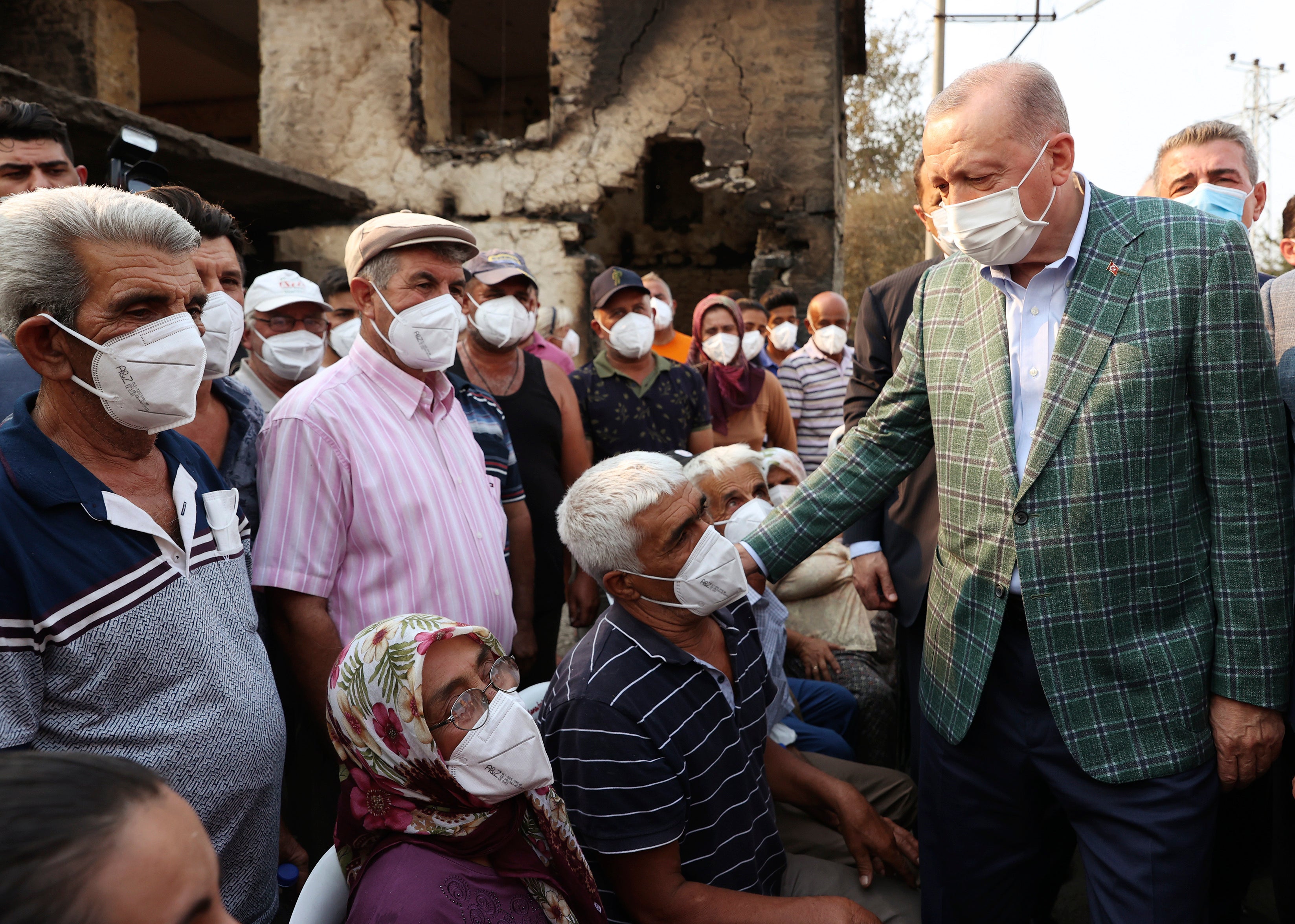Turkey's Erdogan faces mounting criticism over wildfires
Turkish President Recep Tayyip Erdogan’s government is facing increased criticism over its apparent poor response and inadequate preparedness for large-scale wildfires that have left eight people dead and forced thousands to flee their homes in southern coastal resorts

Your support helps us to tell the story
From reproductive rights to climate change to Big Tech, The Independent is on the ground when the story is developing. Whether it's investigating the financials of Elon Musk's pro-Trump PAC or producing our latest documentary, 'The A Word', which shines a light on the American women fighting for reproductive rights, we know how important it is to parse out the facts from the messaging.
At such a critical moment in US history, we need reporters on the ground. Your donation allows us to keep sending journalists to speak to both sides of the story.
The Independent is trusted by Americans across the entire political spectrum. And unlike many other quality news outlets, we choose not to lock Americans out of our reporting and analysis with paywalls. We believe quality journalism should be available to everyone, paid for by those who can afford it.
Your support makes all the difference.As Turkish fire crews pressed ahead Tuesday with their weeklong battle against blazes tearing through forests and villages on the country's southern coast, President Recep Tayyip Erdogan’s government faced increased criticism over its apparent poor response and inadequate preparedness for large-scale wildfires.
Fed by strong winds and scorching temperatures, the fires that began Wednesday have left eight people dead, forced thousands of residents and tourists to flee homes or vacation resorts in boats or convoys of cars and trucks. Charred and blackened trees have replaced some of the pine-coated hills in Turkey’s Turquoise Coast while many villagers lost homes and livestock.
Firefighters were still tackling nine fires in the coastal province of Antalya and Mugla that are popular tourist destinations. Other active fires were reported in the provinces of Adana and Isparta. In all, 137 fires that broke out in over 30 provinces since Wednesday have been put out, officials said.
A senior Turkish forestry official described the wildfires as the worst in Turkey in living memory, though he could not say how many acres of forest land the fires had devoured. He also could not estimate how long it would take the crews to put the fires out, saying strong winds were reigniting flames that had previously been brought under control. The official spoke on condition of anonymity in line with government regulations.
As residents lost homes and livestock, anger turned toward the government, which admitted that it did not have a firefighting aircraft fleet, and that the existing planes were not in usable condition. Opposition parties accused the government of failing to procure fire-fighting planes while channeling funds for construction projects that they say are harmful to the environment.
Erdogan’s government has also been accused of compromising firefighting efforts by refusing help from Western nations, including rival Greece during the early stages of the fires. Agriculture and Forestry Minister Bekir Pakdemirli rejected the accusation, saying that the government had only refused offers for planes whose water-dumping capacities were less than five tons.
The Israeli Embassy said Tuesday that Israel had also offered to help but that Turkish officials had refused the offer, saying the “situation is under control.” It said the offer still stands.
Local mayors posted videos pleading for areal firefighting responses to wildfires in their areas while celebrities joined a social media campaign requesting foreign help to combat the blazes. The campaign drew an angry response from a top Erdogan aide, Fahrettin Altun, who said “Our Turkey is strong. Our state is standing strong.”
Erdogan, meanwhile, has also been accused of insensitivity after he threw bags of tea at residents from a bus during a weekend visit to the fire-hit Antalya region.
Fire-dumping planes sent from Spain and Croatia were set to join planes from Russia, Iran, Ukraine and Azerbaijan on Tuesday. A total of 16 planes, 51 helicopters and more than 5,000 personnel were tackling the fires, officials said.
Health Minister Fahrettin Koca said 36 people in Mugla and 11 people in Antalya were still being treated in hospitals for fire-related injuries.
Authorities have launched investigations into the cause of the fires, including possible sabotage by Kurdish militants. Experts, however, mostly point to climate change as being behind the fires, along with accidents caused by people.
A heat wave across southern Europe, fed by hot air from North Africa, has led to wildfires across the Mediterranean, including in Italy and Greece.
In Italy, the head of the civil protection agency, Fabrizio Curcio, described wildfires affecting much of central and southern Italy as “dramatic.” Firefighters on Tuesday were fighting seven major blazes in Calabria, Sicily, Basilicata and Puglia, employing aircraft near Matera, in Basilicata and around three fires in Calabria. They carried out more than 1,100 interventions in the last 24 hours.
___
Follow all AP stories on climate change issues at https://apnews.com/hub/climate.